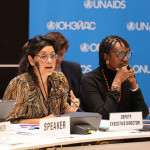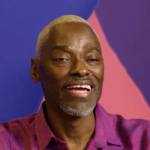Health GAP core member Mark Milano was featured on PBS for World AIDS Day: “I’ve confronted people in power who are not doing what they should be doing to help people with HIV.”
Video: http://www.thirteen.org/metrofocus/2015/12/battling-the-hivaids-stigma/
On World AIDS Day, New York officials and agencies were full of good news about its fight against HIV/AIDS. A city health department report shows deaths and new diagnoses continued to decline and New York Gov. Andrew Cuomo and New York City Mayor Bill de Blasio each announced more money toward the plan to end the HIV/AIDS epidemic in the state by 2020.
But while state and city leaders tout their progress and efforts to tackle the health effects of the disease, another problem lingers: the stigma. Thanks to medical advances, an HIV diagnosis is no longer a death sentence but it can still feel life-ending, says AIDS activist and educator Mark Milano.
’I counseled a gay man, a 32-year-old gay man last month who was diagnosed,’ Milano told MetroFocus Host Jack Ford. ’He was fine with the fact that he would live a normal life span, and his health would be fine. It was the stigma that had drove him into a horrible spiral of despair, because all of his friends had looked down on people with HIV and now he knew if he told them he had HIV, they would all be looking down on him.’
Milano says medicine has advanced but progress on countering the fear and shame associated with the disease hasn’t kept up.
’HIV-negative men treat HIV-positive gay men just horribly,’ Milano said.
Today, better treatment means more people are living with the disease, like Milano, who was diganosed 34 years ago. The Centers for Disease Control and Prevention estimate 1.2 million Americans are living with HIV, and nearly 10 percent call New York City home. Figures released Tuesday morning show 119,550 people with HIV/AIDS resided in the city as of last year. Milano helps some of these New Yorkers at his ’Living With HIV’ workshops for the nonprofit, ACRIA.
’What I say is having HIV is not going to end your life, but it is going to change it,’ he said. ’Health has to go to the top of your list of priorities, that has to be the most important thing. And then you have to find a way to look inside and find the inner-strength to fight this thing and to say, ’I’m not going to let HIV define me, it’s simply a virus in my body.’’
Although you can live with the disease, Milano says the impacts should not be downplayed.
’I’ll turn 60 next year and I’ve had HIV for 34 years -- that doesn’t mean that I’m not dealing with a whole ton of health issues that it’s not just popping a pill a day. It’s not that simple,’ he said.
Milano says World AIDS Day, which is observed every Dec. 1, helps bring HIV/AIDS issues into the spotlight.
’It’s important to keep HIV and AIDS in the public eye because it has not gone away. It’s not the horrible -- well it’s a plague, but it’s not the horrible death sentence that it was in the 80s. But people are still getting infected. More people are luckily living longer but that comes with its own problems,’ he said. ’In New York, over half of people with HIV are now over the age of 50, and so we need to make sure that people know we’re still fighting this illness. Globally, 34 million people are living with HIV; less than half of them are on treatment, so a whole number of issues that have to be addressed.’
Milano’s workshops take place every other Wednesday.
Health GAP: We are an organization of U.S.-based AIDS and human rights activists, people living with HIV/AIDS, public health experts, fair trade advocates and concerned individuals who campaign against policies of neglect and avarice that deny treatment to millions and fuel the spread of HIV. We are dedicated to eliminating barriers to global access to affordable life-sustaining medicines for people living with HIV/AIDS as key to a comprehensive strategy to confront and ultimately stop the AIDS pandemic. We believe that the human right to life and to health must prevail over the pharmaceutical industry’s excessive profits and expanding patent rights.








Comments
Comments